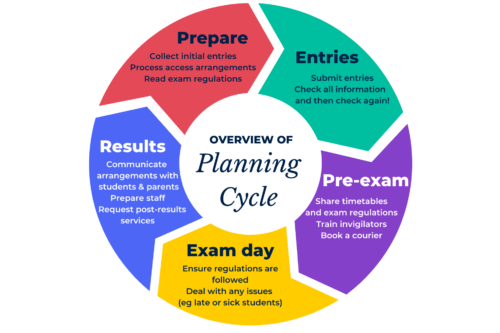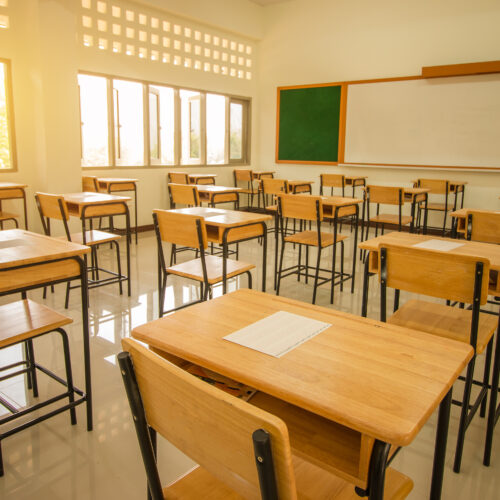
Read top tips from experienced Exams Officers in international schools to help your exam series run smoothly - and what to do if there are problems.
Exams Officers have a vital yet often undervalued role. Alongside ensuring exams run smoothly, they can help protect a school’s reputation by preventing malpractice and saving money through avoiding late entry fees – and sometimes juggle these responsibilities with teaching or other roles. While all exam board provide lots of helpful resources, such as processes, forms and dates for entries and results (you can find these in our Exams Administration section), OxfordAQA knows that there’s a lot more to it than just administration, so we’ve collected advice from experienced Exams Officers and Exams Integrity experts from the international school community to help you.
The most common skills our advisors identified were organisation, communication, attention to detail and the ability to remain calm in a crisis, and we’ve turned these into a series of top tips to help you make sure your exam series runs smoothly.
Plan and prepare
The more detailed your plan, the smoother the exams will run. We recommend creating an annual plan that includes both internal and external deadlines – so all the dates provided by exam boards, such as entry deadlines and exam timetables, alongside deadlines, events and exams happening in your school. To make sure you are equipped with access to all the necessary systems, including Centre Services, take a look at our Exams Officer Training webinars that run throughout the year. Alternatively, you can complete our Exams Officer e-learning course, which is available at any time, from anywhere, and guides you through all the systems OxfordAQA uses.
Make sure your plans include time to check everything – especially students’ personal details, entries and results. We’d also encourage you to keep records for inspections and to help with your future planning.
The below graphic outlines the planning cycle for exams, providing an example of how you may structure this yourself.

Treat internal exams the same as external exams
Not all exams your school holds are externally assessed – and internal exams are a great opportunity to practice for OxfordAQA exam seasons. Treating internal exams in the same way as external exams as far as possible allows you to:
- test your processes
- give everyone a chance to practice and get familiar with the process
- discover and then iron out any problems
- improve your planning
Students, staff and parents will also develop a better understanding of the regulations, the issues that can arise and how to deal with problems on the day. And above all, students will be more familiar with the exam day process – which will reduce their stress and increase their chances of success when the time comes for the high stakes, external exams.
Communicate!
Every advisor agreed that communication is key and should be included in your annual planning cycle – as part of your role, you will need to communicate effectively with students, invigilators, teachers, senior staff, parents, exam boards, couriers, inspectors and many more.
We have created a list of items to help you form your communications plan. Please note that this list is not exhaustive – every school has different needs – but simply provides a useful starting point:
- Give timetables to teachers and students well in advance – they’ll help spot any mistakes or queries.
- Give information about exam regulations to both students and parents – this will help reduce instances of malpractice.
- Give detailed instructions to invigilators before the exam series so there’s time to discuss any queries or misunderstandings.
- Tell parents in advance what to do if their child has a problem on the day of an exam and what the outcome is likely to be – this will reduce stress and panic if their child is ill or has a family emergency.
- Record ‘announcement to candidates’ in advance to save time.
- Let teachers, students and parents know when and how they can access results and what to do if they’re not happy – this will help results days to run smoothly.
Don’t rely on one method of communicating!
It’s key to use what’s available in your school to help ensure the information gets through. This could include emails, letters home to parents, adding information to the school’s website, posters, giving information in assemblies and at staff meetings or even social media. You may have other communication channels you use in your school community too.
Familiarise yourself with OxfordAQA’s malpractice policy
‘Malpractice’ means any act, default or practice which is in breach of our regulations or does any or all of the following:
- gives rise to prejudice to students
- compromises public confidence in qualifications
- compromises, attempts to compromise or may compromise the process of assessment, the integrity of any qualification or the validity of a result or certificate
- damages the authority, reputation or credibility of OxfordAQA, a school or any officer, employee or agent of OxfordAQA or a school
We have produced a complete set of definitions and guidelines surrounding malpractice. However, we have also broken the several types of malpractice down to illustrate how these may differ depending on the implicated individual(s).
Exams Officer/Invigilator Malpractice
This is often an oversight or mistake, such as opening the wrong pack of papers, but it can have serious implications.
If noticed before any papers are handed out, the sanction is likely to be lower – we realise mistakes can happen. However, if the paper has already been given out, this is much more serious.
If an exam paper is compromised by an individual’s actions, either through distributing the wrong paper or not keeping papers secure, there are repercussions for that individual and possibly the school, with the most severe school sanction being a ban from entering any OxfordAQA exams for a period of time.
- Make sure you keep exam papers secure until the day of the exam and only open them a maximum of 90 minutes before the start time.
- Keep all papers in the secure storage area until at least an hour before the exam.
- Do not leave any papers unattended before the exam.
- Check the details on the packet to make sure you are definitely opening the right one.
- Remember to do the ‘second pair of eyes’ check before opening a pack of papers and record that you have completed the check.
- If you do open the wrong pack, do not panic. Reseal it, put it back in secure storage, and contact us.
Teacher malpractice
Deliberate teacher malpractice, such as leaking content from a paper or aiding students with their non-exam assessment is exceptionally rare but can happen.
As well as the teacher being sanctioned, students’ results can also be affected. The sanctions for a teacher may be very serious, to the point where they are not allowed to have any involvement with future OxfordAQA exams.
Pointing to something or whispering a word during a language speaking exam to prompt a student would also be classed as improper assistance and may result in a sanction for the teacher.
- Familiarise yourself with the rules around ‘non-exam assessments’ and exam preparation.
- Be careful when offering advice or assistance to students and make sure that you are keeping within the rules.
Student malpractice
By far the most common malpractice among students is taking mobile phones into exams. Students found with a phone in their possession during an exam will lose all their marks for that paper and could even be disqualified from that entire qualification.
Sharing confidential exam materials online or in group chats is another issue we occasionally encounter, which can have serious consequences. If someone does this, that individual has compromised that exam for everyone in that group.
Even if it is an unsolicited message, all those students have received material that could give them an unfair advantage so there are repercussions for them too, as we must protect the integrity of the exam. In the most serious cases of sharing confidential materials, a student can be disqualified from an entire qualification or even from all OxfordAQA exams.
Another point of student malpractice is around leaving the exam room. When sitting an exam, students are not allowed to leave the exam room until after the first hour of the published start time has passed. Any student deliberately leaving the room before the permitted time may be disqualified from that exam.
- Ensure students are aware of the rules surrounding what is permitted in the exam room – remind students to either leave their phone at home or hand it in before entering the room.
- As much as possible, be aware of social media or group chats and remind students that even unwanted information can affect their results.
- Inform students that they must report any messages containing material supposedly from an exam paper immediately to you, a teacher or OxfordAQA directly, without sharing it with anyone else.
- Ensure students know the rules around leaving the exam room and practice this during internal exams.
This guidance is designed to help you develop the key skills – organisation, communication, attention to detail and the ability to remain calm in a crisis – needed to complete your vital role with confidence.
You can find all the information you need about OxfordAQA exams on our Exams Administration section. If you have any questions about exams that you cannot find the answer for on our website, you can email [email protected].



